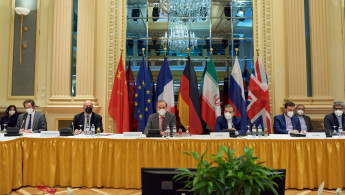Iran rejects European deal to limit nuclear production
A tripartite plan presented by European officials, which would extend Iran's "breakout time" and make a revival of the Iran nuclear deal more feasible, has been rejected by Iran, according to a report by the Wall Street Journal.
The proposed deal would have lengthened the time that Iran would need to produce the materials required to create a nuclear weapon.
The rejected plan would have also seen advanced centrifuges put into storage, electronic infrastructure used to operate machines currently prohibited under the terms of the deal removed, and the country's ability to produce new centrifuges reduced.
According to the report, negotiators also got close to agreeing to a deal that would be have seen Iran's uranium stockpile sent to Russia, but several sources close to the talks have said that Iran is insistent that it will not allow any of its advanced centrifuges to be destroyed.
It is not known whether the European deal was proposed as part of the ongoing negotiations in Vienna, or independent of the talks.
Talks between Iran and Western powers have been ongoing for months, aimed at restarting the 2015 Iran nuclear deal, but fresh doubts have been cast on the negotiations with the election of Iranian hardliner Ebrahim Raisi.
Since sanctions were imposed by Donald Trump's administration, Iran has been increasing its enrichment levels, which have witnessed a drastic rise as negotiations have progressed.
Both sides appear to be well aware of the time constraints to form a new deal, and the ratcheting of tensions is building pressure on the negotiations.
"They [Iran] will keep pushing their program, enriching with advanced centrifuges, enriching to 60 percent, producing uranium metal, limiting IAEA access. … They want sanctions relief even as they seek to show they are in no hurry to get it," said Dennis Ross, a former senior US diplomat to Foreign Policy.
"There will come a point - but we’re not there yet…where if Iran continues to advance its program and there's no deal, then it will be very hard, if not impossible, to recapture the nonproliferation benefits," warned US special Iran envoy Rob Malley, speaking to CNN.
While European powers have warned that previous progress made at the talks could be lost, if Iran continues to push the limits its nuclear
"We have repeatedly stressed that time is on no one’s side. With its latest steps, Iran is threatening a successful outcome to the Vienna talks despite the progress achieved in six rounds of negotiations to date," said the foreign ministers of France, Britain and Germany last week.





 Follow the Middle East's top stories in English at The New Arab on Google News
Follow the Middle East's top stories in English at The New Arab on Google News
![Netanyahu furiously denounced the ICC [Getty]](/sites/default/files/styles/image_330x185/public/2024-11/GettyImages-2169352575.jpg?h=199d8c1f&itok=-vRiruf5)
![Both Hamas and the Palestinian Authority welcomed the ICC arrest warrants [Getty]](/sites/default/files/styles/image_330x185/public/2024-11/GettyImages-2178351173.jpg?h=199d8c1f&itok=TV858iVg)
